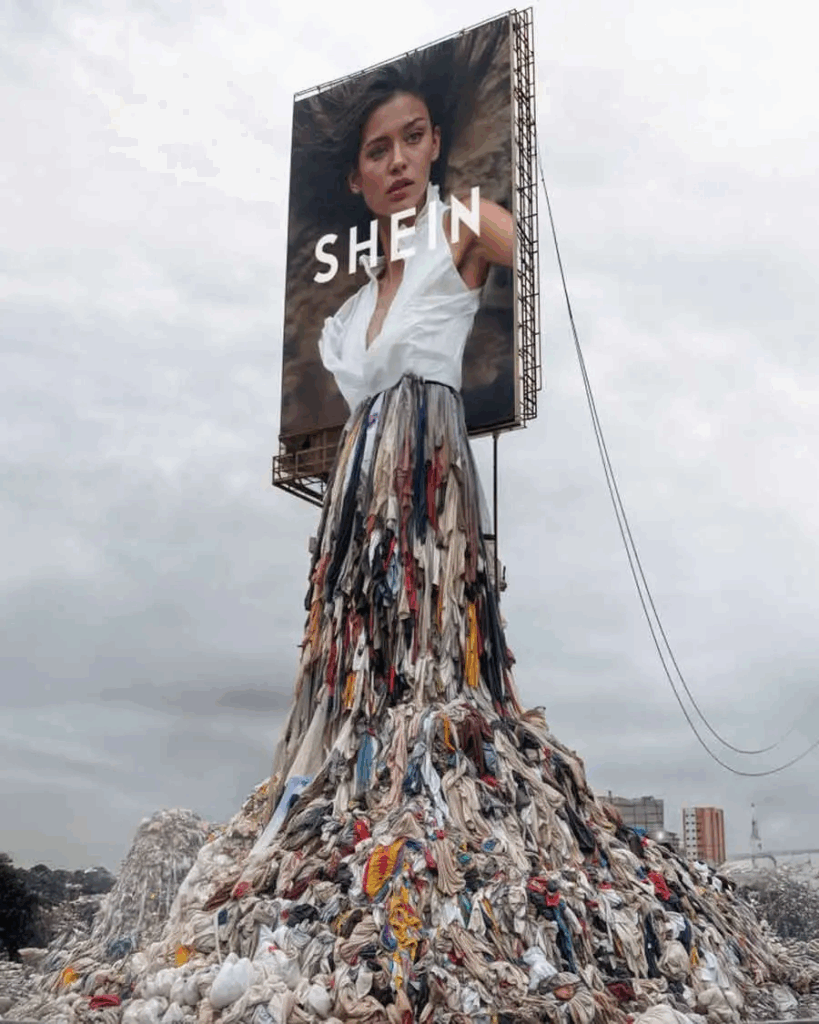With “An Empire Built on Waste” digital artist and designer Emanuele (Jane) Morelli issues a striking visual condemnation of the fast fashion industry, focusing on the unchecked overproduction model fueled by global giants such as SHEIN. Created using the AI tool Midjourney, the piece presents a haunting landscape formed entirely of textile waste—towering mountains of discarded clothing that starkly visualize the environmental and human costs buried beneath the allure of cheap trends.
«Every haul, every impulsive swipe, every €2 top, feeds a mountain. A mountain that doesn’t disappear when the trend passes,» writes Morelli in the post accompanying the image. For the artist, this isn’t exaggeration—it’s a mirror. One that reflects the often-invisible fallout of fast fashion: exploitative labor practices, synthetic fabrics that do not biodegrade, microplastic pollution, and carbon-intensive supply chains hidden behind glossy e-commerce storefronts.
Fast fashion’s wastefulness is staggering. Brands like SHEIN produce thousands of new styles every day, churning out garments at such a rapid pace that clothing has become nearly disposable. Items are designed to be worn only a handful of times—if at all—before being tossed aside. The result is a glut of unsold, unwanted, and quickly discarded clothing that often ends up in landfills or is exported to Global South nations, where it disrupts local markets and creates mountains of unmanageable waste. These synthetic textiles can take hundreds of years to decompose, all while leaching toxic chemicals into the soil and water.

Moreover, fast fashion thrives on a business model of planned obsolescence—new trends emerge weekly, pressuring consumers to keep buying. This system is not only ecologically destructive, but socially corrosive, propped up by underpaid garment workers laboring in unsafe conditions. The industry contributes approximately 10% of global carbon emissions, more than international flights and maritime shipping combined.
But Morelli’s piece doesn’t just indict fashion conglomerates—it also invites self-reflection. The comment section beneath the work’s online debut quickly erupted with debate. One critique in particular struck a chord:
«You justify using AI by saying the message wouldn’t have come through with other means, but clearly the message didn’t get through anyway. Don’t you see? Using AI destroys the planet in the same way as fast fashion and brands like SHEIN. Your message is useless if spreading it contributes to the planet’s destruction».
This objection opens a deeper ethical inquiry: can an artwork that denounces unsustainable practices remain credible if it employs tools—like generative AI—that also have significant environmental footprints? AI image generation relies on vast computing power, often run on non-renewable energy sources, raising concerns about its own contributions to climate change.
Morelli has addressed these critiques in past discussions, acknowledging that artificial intelligence is not a neutral medium. However, the artist argues that AI provides the visual intensity and conceptual abstraction needed to depict the systemic nature of waste, exploitation, and invisibility. In *Empire* the surreal landscapes produced by Midjourney do more than illustrate—they confront. They collapse the abstract and the tangible into a visual metaphor too grotesque to ignore.

With this latest work, the tone shifts from symbolic to overtly political. «Fast fashion isn’t fashion. It’s a cycle of extraction, production, pollution, and waste, disguised as choice,» writes Morelli. And adds: «We can’t keep celebrating empires built on exploitation and call them innovation».
Rather than offering neat solutions, the piece and the dialogue it ignites ask difficult, unresolved questions: Can ethical messages survive when mediated by ethically compromised tools? Does intention outweigh method? The specter of hypocrisy hovers—but perhaps that tension is precisely the point. In a world entangled with contradictions, art may serve best not by resolving them, but by exposing them.
Ultimately, the artist’s call to action is uncompromising: «It’s time to rebuild—slower, fairer, cleaner». Discover our sustainable art packing solutions and register for your trade account today. Need advice? Contact our team via info@artpakk.com or call +44 (0)1245 95 69 17.